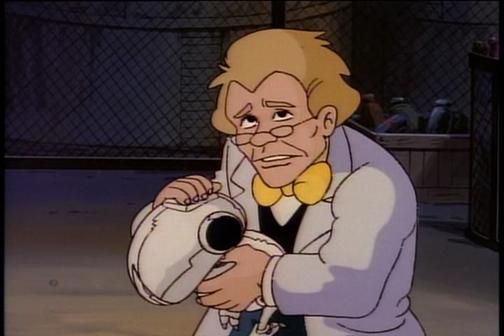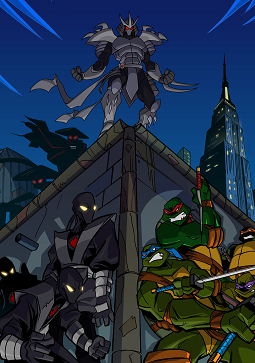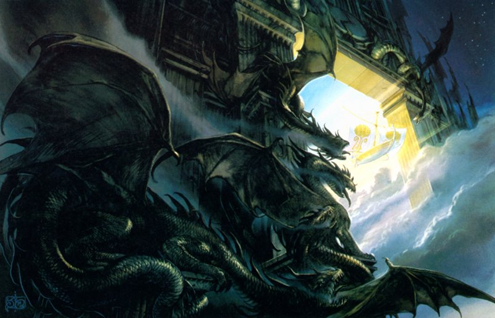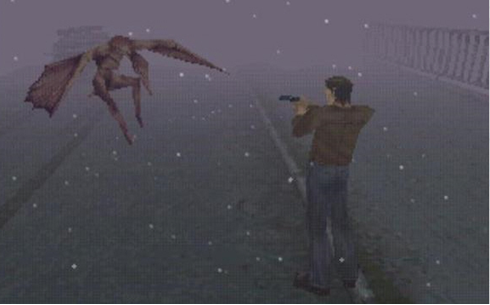
Based on casual browsing of several Turtles fansites, as well as comments on YouTube and TVTropes.org, it seems like a lot of people see the Fred Wolf version of Baxter Stockman. The nebbish mad scientist/fly monster with a voice like a cat being strangled and a lot of bad times is seen as an innocent victim, even a "tragic" character, which just ain't true.
I say this as someone who likes the character (and several other versions of him), and finds him adorably pathetic and endearingly stupid. But it's the same old thing: just because you like a character, doesn't mean you excuse their actions. While villain apologism for cooler and stronger villains has already been discussed by others, I figured it was time for me to take a crack at it.
But why would a comedic cartoon with absolute moral lines provoke villain apologism? Villain apologism, no matter how ridiculous it can get, is at least understandable when inspired by works that have grey morality and villains with developed, sympathetic motivations. Baxter Stockman has none of these things, and is largely a joke even by the rules of his own jokey universe, which means this all oughta be an open-and-shut case. However, the apologism happens anyway, and for two major reasons.
The first is that if one looks at Baxter's story without considering his actions, you can see him as an ordinary guy who wanted to sell his rat-killing robots, but ends up working for a supervillain, going insane, and turning into a fly monster that's slowly losing his mind. Several technical problems with his character arc also might provoke viewers to not only feel sorry for him, but to excuse him.
But Baxter is solidly a villain, with that fact becoming harder to deny as he changes. The fundamental truth is always that regardless of a character's circumstances, if they do evil things with joy, they're the bad guys. I feel like getting more technical about it, though, so I'll discuss why Fred Wolf Baxter Stockman might be exonerated by viewers, and why this doesn't hold up.
The first issue is the way Fred Wolf Baxter is handled in his first appearance, in the third episode of the series, "A Thing About Rats". Here, he's a relatively ordinary person; not a "mad" scientist: not even slightly disgruntled. Baxter gives Shredder his Mousers, and willingly, but he doesn't revel in the destruction being wreaked, nor even seems to be aware of it.
Instead, he spends most of the episode just standing around looking scared and bewildered, and passively following commands. For a series that is usually so blatant about its evildoers, this seems strange, and might push viewers' sympathies towards Baxter.
Baxter is not totally clean here: he shows a little bit of arrogance when the Shredder picks him up, saying. "Well, it's about time somebody discovered me!", and insolence, talking back to the Turtles when they try to interrogate him. But these things aren't a major part of his character, and someone would have far too high standards to think of this as villainous behaviour by itself.
It does still unbalance me a little, that Baxter's initial appearance had him be so completely non-threatening, and that the series mistakenly said Baxter tried to "take over the city" with his Mousers. In the former case, I really wonder why David Wise wrote him that way. It's possible that Baxter really was meant to be as hard-luck as viewers perceive him, but nothing else about him gives this impression. There's no sense of direction to Baxter's portrayal, no sense that the writers are drawing on dark humour to deliberately present him as a character with a hilariously terrible life. It's a real wasted opportunity.
However, a character's motives and bearing are, at a certain point, irrelevant: you do the crime, you do the time, regardless of your personality. Baxter gave his invention to the Shredder, so he should be held responsible for what was done with it.
In this universe, the Turtles also get their iconic vehicles by stealing stuff that was in Baxter's lab, which I do consider to be unfair.
Sheer pragmatism could justify this Turtledickery—after all, Baxter isn't going to need it, right?
But viewers do expect heroes to have the moral high ground, and not leave everything to mercenary laws. The Turtles stealing Baxter's shit is one of those lazy writer's things where anything the heroes do is right because they are labelled heroes, and they don't actually need to prove themselves to the audience.
But that doesn't change any of the other facts. So, while I don't agree with the conclusions viewers reach, I can see why some fans would ignore what episodes four and five of season one are trying to tell us, and see Baxter as innocent instead.
As the story goes on, however, understanding why Baxter is viewed as innocent gets harder to do. In the second season, Baxter reappears as Shredder's obsequious, cowardly sidekick, now an obvious "mad scientist" with a changed character design that includes long, shaggy hair.
In this position, Baxter Stockman's moral role is clearer: while he is frightened of the Shredder, when Baxter happens to get his hands on something to attack or bully another character with, he revels in it. "Curse of the Evil Eye" is the most obvious example, when Baxter steals the completed MacGuffin, the Eye of Sarnath, and has some fun with it (and looks very funny with Shredder's helmet on).
Baxter also enjoys his Ultimate Rat-Catcher in "Return of the Shredder", too, the modified construction vehicle that he happily attacks Splinter and the Turtles with. Because of incidents like these, it's no longer possible to read Baxter as a character unknowingly working for a villain, or removed from what that villain does, when Baxter has a clear villainous side himself.
I disagree with anyone who's suggested that the Eye corrupted Baxter and made him more vicious and power-mad than he would otherwise be. Baxter wanted to get the damn thing in the first place, and doing so is consistent with his character—no matter how much he simpers at the Shredder, there's still evidence that Baxter thinks highly of himself, as someone deserving of more than he gets, and "Curse of the Evil Eye" is where that all comes to a head.
But there are still writing problems that apparently don't make the opinion come smoothly to some viewers. The chief question is why Baxter now acts wholly evil, and why he is now so eager to work for the Shredder, with a much more devoted, fawning attitude than before.
Baxter is clearly intended to have some kind of mental issues going on, but it's never defined how he became insane, or if this explains his changes in personality. In this confusion, I can see why some viewers might try to give Baxter the benefit of the doubt, to in effect "plead insanity" for him. Since Baxter is no longer in a stable state of mind, being an evil henchman is something he can't be blamed for.
Furthermore, some of the people editing the TV Tropes page for the Fred Wolf series are squeamish about Shredder's treatment of Baxter in season two, which I sort of don't share. It's the standard stuff, you know: the lead villain yelling at his stupid henchman, who cringes and apologizes. I feel sorry for Baxter because I like the character, but there's nothing in his treatment that's actually unusual. (And it's funny, too).
They must think it looks worse when the Shredder is picking on a smaller, older human who is terrified and might not have asked to be a villain in the first place. With Bebop and Rocksteady, they were bad seeds right we first see them, oblivious rather than scared, and bigger and more monstrous than the Shredder, so maybe it doesn't look as bad to some.
Nonetheless, Baxter's episodes as a human mark him as a villain. That his turn to evil is never explained is not meant to be relevant, and no matter how scared Baxter is of the Shredder, he clearly likes doing evil deeds, and so can't be excused for anything.
Of course, usually perceptions of Baxter Stockman's innocence don't revolve around him as a human, but as a fly-creature. Baxterfly is seen as someone who just wanted to be normal again, and had a "tragic" ending where the writers stop bringing him out of the dimensions he gets formulaically trapped in, so that he's in dimensional limbo for all time. His little bit of transformation angst, and his oddly cute Boston Terrier-like features might further endear him to viewers.
Okay...but the "wanting to be normal" thing typically takes a backseat to "get revenge on people, sometimes by also turning them into monsters". Baxterfly is the most definitively and actively villainous of all versions of White Baxter, and the morals of the situation are still simple: even if you hate being a bug-thing, if you keep hurting and attacking other people, you deserve what happens to you.
Throughout the episodes he appeared in, Baxter kidnapped April, tried to kill the Turtles with poison gas, tried to turn the main cast into animals, trapped the Turtles in the gears of a clock, attacked the city with a legion of flies, and tried to turn everyone into bug monsters. You can't think of him as anything even approaching innocent. At best, he gets forgetful of the evil he wants to do, but never for very long.
In most of these episodes, Baxter follows around Zee, the Hal 9000 parody he discovered in an alien ship, now embodied as a 90s desktop PC and Baxter's BFF (though personally, I find Zee a little smarmy and always wonder if he's up to something else). Zee is an enabler, always reminding Baxter of the evil that he wants to do, and helping him to do it. At the same time, Baxter's clearly acting on his own desires.
The jury is still out on whether "Revenge of the Fly", Baxter's last appearance, was meant to have any kind of finality to it. However, it's hard to view it as a sad ending when Baxter's actions are his own fault. Besides, even if more had been done with the character, though, the Fred Wolf series is not one where the villains would ever get what they want, whether it's taking over the world or getting a human body back. I can't view this episode as saddening, or shocking.
What's more irritating is there is no finality to Baxter's character, which would have been more plausible than his becoming human again. Zee could have been killed by Donatello, but otherwise "end up stick in another dimension" is the ending to most Baxterfly episodes, so this doesn't feel like any kind of conclusion for him, but just a standard Baxterfly episode after which no more were made.
I don't mind fans wishing things were different—in that case, I'm not immune. It's just that a lot of people don't seem to understand what kinds of series we were dealing with, and what we could have expected of it. That kind of knowledge can exist independent of personal attachments. Just like knowing a character has committed evil actions doesn't mean you have to dislike them.
In short, the assumption that Fred Wolf Baxter Stockman is an innocent character isn't true. At one point, he did seem ordinary, but he still was involved with evil acts, and after that, it was all downhill from there, as he became more and more villainous. The fact that some of this is not fully explained isn't relevant. He's a bad guy. Often not very good at it, but he still is one.




